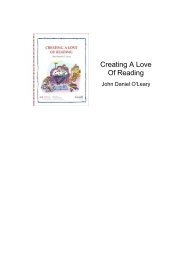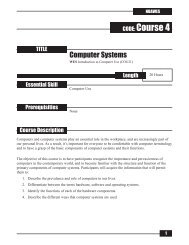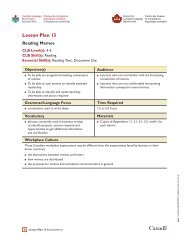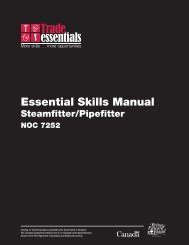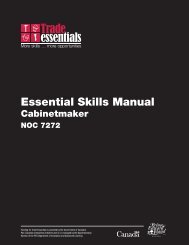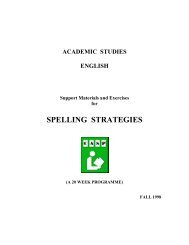Integrating Essential Skills into Training - National Adult Literacy ...
Integrating Essential Skills into Training - National Adult Literacy ...
Integrating Essential Skills into Training - National Adult Literacy ...
Create successful ePaper yourself
Turn your PDF publications into a flip-book with our unique Google optimized e-Paper software.
Job Task Planning and Organizing<br />
Job task planning and organizing refers to how workers plan and organize their tasks and<br />
work schedules.<br />
Some considerations:<br />
◊ the extent of variety in work activities (how routine is the job?)<br />
◊ whether the task sequence is provided to the worker or determined by the worker<br />
◊ whether priorities are provided to the worker or they are determined by the worker<br />
◊ the extent to which daily work activities are disrupted<br />
◊ the extent to which the worker’s own plan must be integrated <strong>into</strong> the plans of others<br />
◊ the number of sources for work assignments<br />
◊ the extent to which the order of those tasks sequenced by the worker makes a<br />
difference to total efficiency<br />
◊ the extent to which the worker plans and organizes the work of others<br />
◊ the amount of operational planning required of the worker (day-to-day planning to<br />
accomplish immediate organizational goals such as policy and program development,<br />
budgetary considerations, etc.)<br />
◊ the amount of strategic planning required of the worker (long range organizational<br />
planning such as developing mission statements, broad organizational objectives,<br />
critical success indicators, business plans, etc.)<br />
Use of Memory<br />
This includes any significant or unusual use of memory for workers. In other words, the<br />
worker deliberately or consciously commits a piece of information to memory. It does not<br />
include normal memory use that is a requirement for every occupation.<br />
Processes:<br />
♦ Purposeful memorization of procedures, codes, parts number, etc. (Memorization<br />
through repetition.) For example, Luggage attendants must remember airport codes<br />
to sort luggage quickly and correctly.<br />
♦ Remembering information for brief periods (minutes or hours). For example,<br />
Labourers are told several things they are to do and must remember this list of tasks<br />
until all are completed.<br />
♦ Experiencing unique events in which "learning" occurs from one exposure. For<br />
example, Nursery workers remember diagnoses of plant disease and damage<br />
conditions in order to identify them in the future.<br />
In an <strong>Essential</strong> <strong>Skills</strong> Profile, no complexity ratings are assigned to Use of Memory examples.




